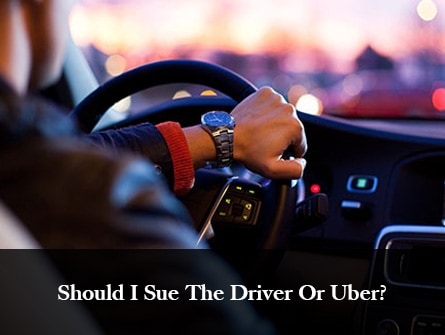Call Us For A Free Consultation
(954) 928-9880
Call Us For A Free Consultation
(954) 928-9880
Should I Sue The Driver Or Uber?
 If you were seriously injured while riding in a rideshare vehicle, such as Uber or Lyft, it could be tempting to go after everyone involved in the accident. However, depending on your specific situation, going after every single person and entity may not be the best solution. For one thing, you could deplete resources, time, and money going about it that way. In truth, you want to make sound decisions and act on your options effectively and efficiently. Hiring a rideshare accident attorney is recommended, and should be considered if you were involved in a rideshare accident.
If you were seriously injured while riding in a rideshare vehicle, such as Uber or Lyft, it could be tempting to go after everyone involved in the accident. However, depending on your specific situation, going after every single person and entity may not be the best solution. For one thing, you could deplete resources, time, and money going about it that way. In truth, you want to make sound decisions and act on your options effectively and efficiently. Hiring a rideshare accident attorney is recommended, and should be considered if you were involved in a rideshare accident.
Rideshare passengers are usually covered by the at-fault party’s personal car insurance company or the rideshare company’s third-party liability policy. If coverage and compensation for damages are not sufficient under an Uber driver’s policy, Uber’s third-party liability policy or uninsured/underinsured policy will kick in. Each policy covers up to $1 million. In most cases, $1 million is enough to cover medical expenses, bills, lost wages, pain and suffering, and other damages. However, in the instance that the accident was severe and $1 million is insufficient, the rideshare passenger has the right to pursue a lawsuit directly with the rideshare company or the Uber driver.
With that being said, it may not always be reasonable to go after or sue the Uber driver directly if she or he was responsible for causing an accident. As mentioned, Uber provides coverage in addition to or in the absence of an adequate personal car insurance policy. Furthermore, if an Uber driver does not have significant unprotected assets or means, collecting damages can prove challenging. It is unlikely that a judgment against an Uber driver will be effective and worthwhile unless the driver has substantial unprotected assets.
If you are attempting to collect damages due to a rideshare accident, it is imperative to contact a rideshare accident attorney to discuss your options. A rideshare attorney can explain the process and how to best move forward.

